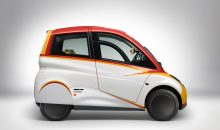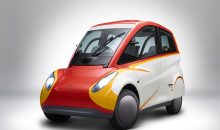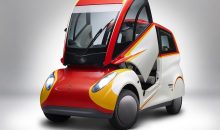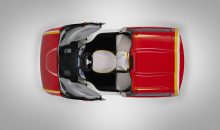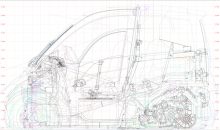Shell has today (22 April 2016) unveiled a concept city car which, if it were ever to go into production, could deliver material reductions in energy use in the road transport sector. The three seater car is tangible proof of energy efficiency improvements that can be achieved by using cutting edge technology available today through a process of “co-engineering” whereby vehicle body, engine design and lubricants are all created together.
Independent testing and a rigorous life-cycle study shows that Shell’s Concept Car would deliver a 34% reduction in primary energy use over its entire lifecycle when compared to a typical city car available in the UK. The Shell Concept Car would use around half the energy required to build and run than a typical small family car available in the UK and 69% less than that of a typical sports utility vehicle available in the UK
The Shell Concept Car is a total rethink of the Gordon Murray Design T.25 city car produced in 2010 for which Shell produced a prototype oil to improve the vehicle’s energy efficiency. The new car is the result of a co- engineering collaboration between world leading vehicle, engine and lubricant designers, with each of the three elements of the vehicle tailored to work optimally with each other. It takes a holistic view on energy reduction focusing on design material selection; reduced energy demand via aggressive downsizing, and streamlining while enhancing the efficiency of energy delivery through innovative engine design and lubricant formulation to minimise the impact in terms of overall energy lifecycle use.
The car’s gasoline consumption has been measured using a range of vehicle testing protocols covering both steady state and urban driving styles. Sample test results include a steady state consumption of 107 miles per gallon [2.64Litres per 100km] [38km/Litres] [89.1 miles per gallon US] at 70kmph/45mph and an improvement of 4.67g CO2/km on the New European Driving Cycle (NEDC) from the use of bespoke lubricants, equivalent to a 5% improvement in fuel efficiency compared to standard lubricants available in the UK.
Mark Gainsborough, Executive Vice-President of Shell’s global lubricants businesses which backed the project said, “This is a significant automobile engineering milestone. I’m very proud of what Shell’s scientists and their partners at Geo Technology and Gordon Murray Design have achieved. Insights gained from this project could be transformational in terms of how we address energy use in the road transport sector. Energy use and climate change are major issues for society. This project shows that if we use the best of today’s technology, including cutting edge lubricants science, we could potentially have a major impact on energy use and reduce CO2 emissions. The improvement in economy derived from the collaborative design of engine and lubricant is impressive and highlights the enormous benefits achieved from close relationships between design partners. It also shows the powerful role that lubricants can potentially play in helping achieve CO2 reduction targets.”
The Shell Concept Car was independently tested at a UK certified automotive testing facility alongside a range of other cars under comparable conditions to measure fuel economy and CO2 emissions. In the formal NEDC test the Shell Concept Car produced lower CO2 emissions than both a typical petrol-powered city car (28%) and a hybrid car (32%).
Shell provided all the fluids for the car, specially ‘designing’ the motor oil to complement and enhance the overall efficiency of the vehicle, principally by minimising friction. Shell’s Lubricants technology team created bespoke engine oil, based on its premium product Shell Helix Ultra with PurePlus Technology. In parallel, engine guru Osamu Goto’s group at Geo Technology optimised the three cylinder petrol engine by re-designing and optimising many of the internal engine components associated with friction. On the cold portion of the NEDC, these fluids reduced CO2 emissions by 7.1% and on the combined cycle by 5.0%, compared to standard lubricants available in the UK, again highlighting the value of co-designing engine and fluids.
Built around Gordon Murray Design’s patented iStream® platform, the Shell Concept Car represents a radical rethink on the way in which cars are designed, developed and produced. It combines cutting-edge lightweight technology – the car weighs just 550kg – and is built using carefully chosen materials which have a low energy and CO2 footprint. Gordon Murray’s experiences in Formula One™ racing have been used to develop the car, particularly its crashworthiness and lightness. A number of the car’s components were created using 3D printing to accelerate the construction of this prototype vehicle. The car also uses recycled carbon fibre for its body that can be assembled for a quarter of the price of a conventional steel car and almost the entire car can be recycled at the end of its life. The car makes use of a modified version of Shell’s Drive App via a smartphone. This App provides the driver with real time feedback via an on-screen graphic which emphasizes the fact that fuel consumption is highly dependent on driver’s behaviour.
From a styling perspective, the Shell Concept Car offers a new take on the ‘tall and narrow’ look, and dials up the fun factor with its sporty central driving position and two passenger seats behind. The design produces an extremely novel seating arrangement allowing three people to be carried despite the car’s diminutive exterior dimensions and gives it a turning circle smaller than that of a London taxi, making it ideal for urban driving.
Dr. Andrew Hepher, Vice President, of Shell’s lubricant research team said: “Our car may be small, but it’s packed with potential. We want to accelerate the conversation about how we make road vehicles more energy efficient and less carbon-intensive. In the coming weeks and months, we look forward to sharing our research insights from this project with engine designers, car manufacturers, academics and other experts across the automotive sector.”
1. Actual benefits are influenced by vehicle, driving conditions and driving style.
2. For further information about the project please see www.projectm.shell.com
ABOUT SHELL LUBRICANTS AND FUELS:
Shell scientists around the world are constantly working in laboratories to develop advanced fuels and lubricants that are designed to help motorists on the road. Shell conduct fuels and lubricants research and development in its technology centres in Houston (USA) and Hamburg (Germany) with dedicated lubricants research additionally in Shanghai (China) and in Japan (in a joint venture with Showa Shell). Shell invests significantly in technology and works closely with its customers to develop innovative lubricants. Shell’s scientists and engineers are passionate in its goal of finding ways to make fuels and lubricants more efficient, while delivering improved performance.
One of the ways we push the boundaries of fuels and lubricants technology is by working closely with top motor racing teams such as Scuderia Ferrari. These Technical Partnerships enable us to expand our knowledge of fuels and lubrication science and transfer cutting-edge technology from the race track to our commercial products.
The term “Shell Lubricants” collectively refers to Shell Group companies engaged in the lubricants business. Shell sells a wide variety of lubricants to meet customer needs across a range of applications. These include consumer motoring, heavy-duty transport, mining, power generation and general engineering. Shell’s portfolio of lubricant brands includes Shell Helix, Pennzoil, Quaker State, Shell Rotella, Shell Tellus and Shell Rimula.
Shell also provides technical and business support to customers, and offers lubricant-related services in addition to the product range. These include: Shell LubeMatch – the market leading product on-line recommendation tool, Shell LubeAdvisor – helps customers to select the right lubricant through highly trained Shell technical staff as well as online tools, and Shell LubeAnalyst – an early warning system that enables customers to monitor the condition of their equipment and lubricant, helping to save money on maintenance and avoid potential lost business through equipment failure.
Shell’s world-class technology works to deliver value to our customers. Innovation, product application and technical collaboration are at the heart of Shell lubricants. Shell has a patent portfolio with 150 + patent series for lubricants, base oils and greases; more than 200 scientists and lubricants engineers dedicated to lubricants research and development.
ABOUT GORDON MURRAY DESIGN:
Gordon Murray Design has built a global reputation as one of the ‘finest automotive design teams in the world’ and was established in 2007 to develop an innovative and disruptive manufacturing technology trademarked iStream®. Gordon Murray Design’s first milestone was the T.25 – a proof-of-concept for the futuristic vision of urban mobility. When it made its debut in mid-2010, the petrol-powered T.25 instantly redefined traditional weight, footprint, safety, usability and efficiency parameters using Gordon Murray Design’s patented iStream® with its innovative use of Formula 1TM technology, simplified for cost for the everyday motorist. Together with the all-electric T.27 that followed in mid-2011, the T.25 was central to both the development and validation of GMD’s ground-breaking iStream® production process. The unique approach and truly creative thinking enables Gordon Murray Design to deliver complete car programmes in a highly efficient and innovative way from concept, design, prototype and development through to production ready product.
ABOUT GEO TECHNOLOGY:
Engine specialist Geo Technology is the brainchild of Osamu Goto, former Director of Honda F1, R&D Manager at Scuderia Ferrari Formula 1 and Member of the Board at a Sauber-owned company. Following his extremely successful work in motorsport, Goto founded Geo Technology – an engineering consultancy company working for the automobile and motorcycle industry. Geo Technology’s highly qualified specialists have broad experience in all technical areas, including engine design, analysis and development, niche manufacturing, advanced materials, electronics and control systems. Together they develop competitive solutions to the most complex challenges, in record times.
CAUTIONARY NOTE:
The companies in which Royal Dutch Shell plc directly and indirectly owns investments are separate legal entities. In this press release “Shell”, “Shell group” and “Royal Dutch Shell” are sometimes used for convenience where references are made to Royal Dutch Shell plc and its subsidiaries in general. Likewise, the words “we”, “us” and “our” are also used to refer to subsidiaries in general or to those who work for them. These expressions are also used where no useful purpose is served by identifying the particular company or companies. ‘‘Subsidiaries’’, “Shell subsidiaries” and “Shell companies” as used in this press release refer to companies over which Royal Dutch Shell plc either directly or indirectly has control. Entities and unincorporated arrangements over which Shell has joint control are generally referred to “joint ventures” and “joint operations” respectively. Entities over which Shell has significant influence but neither control nor joint control are referred to as “associates”. The term “Shell interest” is used for convenience to indicate the direct and/or indirect ownership interest held by Shell in a venture, partnership or company, after exclusion of all third-party interest.
This press release contains forward-looking statements concerning the financial condition, results of operations and businesses of Royal Dutch Shell. All statements other than statements of historical fact are, or may be deemed to be, forward-looking statements. Forward-looking statements are statements of future expectations that are based on management’s current expectations and assumptions and involve known and unknown risks and uncertainties that could cause actual results, performance or events to differ materially from those expressed or implied in these statements. Forward-looking statements include, among other things, statements concerning the potential exposure of Royal Dutch Shell to market risks and statements expressing management’s expectations, beliefs, estimates, forecasts, projections and assumptions. These forward-looking statements are identified by their use of terms and phrases such as ‘‘anticipate’’, ‘‘believe’’, ‘‘could’’, ‘‘estimate’’, ‘‘expect’’, ‘‘goals’’, ‘‘intend’’, ‘‘may’’, ‘‘objectives’’, ‘‘outlook’’, ‘‘plan’’, ‘‘probably’’, ‘‘project’’, ‘‘risks’’, “schedule”, ‘‘seek’’, ‘‘should’’, ‘‘target’’, ‘‘will’’ and similar terms and phrases. There are a number of factors that could affect the future operations of Royal Dutch Shell and could cause those results to differ materially from those expressed in the forward-looking statements included in this press release, including (without limitation): (a) price fluctuations in crude oil and natural gas; (b) changes in demand for Shell’s products; (c) currency fluctuations; (d) drilling and production results; (e) reserves estimates; (f) loss of market share and industry competition; (g) environmental and physical risks; (h) risks associated with the identification of suitable potential acquisition properties and targets, and successful negotiation and completion of such transactions; (i) the risk of doing business in developing countries and countries subject to international sanctions; (j) legislative, fiscal and regulatory developments including regulatory measures addressing climate change; (k) economic and financial market conditions in various countries and regions; (l) political risks, including the risks of expropriation and renegotiation of the terms of contracts with governmental entities, delays or advancements in the approval of projects and delays in the reimbursement for shared costs; and (m) changes in trading conditions. All forward-looking statements contained in this press release are expressly qualified in their entirety by the cautionary statements contained or referred to in this section. Readers should not place undue reliance on forward-looking statements. Additional risk factors that may affect future results are contained in Royal Dutch Shell’s 20-F for the year ended December 31, 2015 (available at www.shell.com/investor and www.sec.gov ). These risk factors also expressly qualify all forward looking statements contained in this press release and should be considered by the reader. Each forward-looking statement speaks only as of the date of this press release, 22.04.16. Neither Royal Dutch Shell plc nor any of its subsidiaries undertake any obligation to publicly update or revise any forward-looking statement as a result of new information, future events or other information. In light of these risks, results could differ materially from those stated, implied or inferred from the forward-looking statements contained in this press release.
We may have used certain terms, such as resources, in this press release that United States Securities and Exchange Commission (SEC) strictly prohibits us from including in our filings with the SEC. U.S. Investors are urged to consider closely the disclosure in our Form 20-F, File No 1-32575, available on the SEC websitewww.sec.gov.

